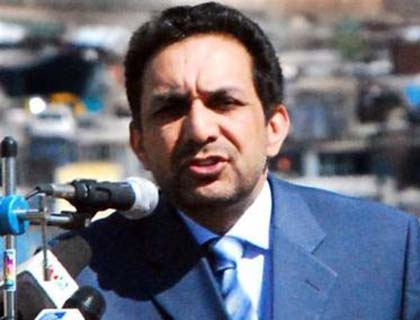If Taliban want peace, we are ready, but if they want to fight, there will be a fight
KABUL - The Taliban must be willing to make compromises in nascent peace talks, a prominent Afghan opposition figure said Friday, warning that ethnic minorities who for years battled the Taliban were prepared to take up arms again if they have to give up too much.
Marc Grossman, the U.S. special envoy to Afghanistan and Pakistan, is expected in Kabul at the weekend to discuss progress in negotiations -- seen by their supporters as the best chance of ending a decade-long war -- with Afghan officials.
Afghanistan National Front (ANF) leader Ahmad Zia Massoud, whose brother once led opposition commanders fighting the Taliban, said he was not confident about the chances of reaching a deal with the Taliban that would be acceptable to their opponents.
And any unbalanced deal forced on the Afghan people would quickly unravel into a fresh civil war, he said.
"If the Taliban are back in the political process, being imposed on us, the Afghan people will definitely resist, paving the way for another war to happen," Zia Massoud told Reuters in an interview at his home in Kabul.
"If the Taliban want peace, we are ready to make peace, but if they want to fight, there will be a fight. That's it. If you coddle them, give them a political address and other gains, they will never be ready for any talks," he said.
The Taliban this month announced that the movement would open a political office in Qatar as a prelude to holding peace talks with the United States and its allies.
As a confidence-building measure, the Taliban called for the release of five officials being held at Guantanamo Bay, a U.S. military enclave and detention center in Cuba.
Zia Massoud, whose brother Ahmad Shah Massoud led the anti-Taliban Northern Alliance until his assassination in 2001 on the eve of the September 11, 2001, attacks on the United States, said the uncertainty around negotiations was creating wide suspicion.
His National Front party, which brings many former Northern Alliance leaders back together, wants to be included in the process to prevent the return of a belligerent Taliban as foreign troops leave. All combat forces are due home by the end of 2014.
"The ambiguity of the peace talks, and sidelining of other political parties, has created suspicion in our minds. If the Taliban are back with the same mindsets and principles, it will create further instability," he said.
Other National Front members, including ethnic Hazara leaders, were already gathering to discuss the ramifications of the talks on already fragile stability in the country, he said.
"The Taliban are an extremist group," he said from his heavily fortified house, hung inside with photos of his brother -- a hero to many Afghans -- and Northern Alliance battles.
"They are heavily linked to al Qaeda. And as long as they are with al Qaeda, they will not be committed to peace in Afghanistan."
Grossman is due to meet this weekend with Karzai, who has long pushed for a negotiated end to the war and said his country agrees to the Qatar office, but has been vocal about concerns he is not at the heart of current talks.
President Hamid Karzai's office told several U.S. newspapers in interviews published Friday that Afghan government officials feared a secret deal with the United States.
"We have been briefed regularly by the Americans, but we don't know all the details. We demand more clarity," Karzai's chief of staff, Abdul Karim Khurram, told journalists, according to the New York Times.
Zia Massoud said he believed the Qatar office was in part aimed at reducing Pakistan's influence on a group it has long supported, and whose leadership is believed to have taken refuge across the border from Afghanistan.
However it would never work if the West lets up military pressure on their battle-hardened opponents and their one-eyed leader, Mullah Muhammad Omar, he added.
"I am quite sure that without military pressure, the Taliban will never be ready for talks," Zia Massoud said. "That's not possible." (Reuters)

